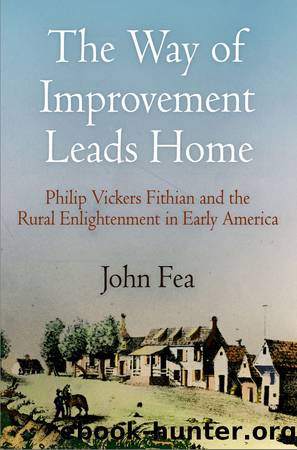The Way of Improvement Leads Home: Philip Vickers Fithian and the Rural Enlightenment in Early America by John Fea

Author:John Fea
Language: eng
Format: epub
Publisher: University of Pennsylvania Press, Inc.
Figure 7. John Witherspoon by Charles Willson Peale, after Charles Willson Peale, 1783â84. Courtesy, Independence National Historical Park, Philadelphia, Pa.
Witherspoon, like many patriot clergymen of his day, claimed to be able to decipher Godâs sovereign will on the question of American independence. The Dominion of Providence over the Passions of Men does not make a sophisticated theological argument for independence but simply assumes, based on secular Whig principles, that Providence was on the side of the colonies: âIf your case is just, if your principles are pure, and if your conduct is prudent, you need not fear the multitude of opposing hosts. If your case is justâyou may look with confidence to the Lord and intreat him to plead it as his own.â If this statement was not enough to convince his readers, Witherspoon provided some specific reasons why God would naturally support the American cause. America, for example, was morally superior to England. Apparently sinful human nature did not have the same effect on the people of the American colonies as it did on the imperial administration in London. âI cannot help observing,â he wrote, âthat though it would be a miracle if there were not many selfish persons among us, and discoveries now and then made of mean and interested transactions, yet they have been comparatively inconsiderable both in number and effect.â The colonies offered relatively few examples of âdishonesty and disaffectionâ because their people exercised greater public spirit than the people of England. And, perhaps most importantly, God was on the side of the Revolution because Americans, as we saw in Chapter 2, had fully embraced the universal and harmonious qualities of the Enlightenment that had permeated their culture in the decades since the end of the First Great Awakening. The colonists did not get caught up in the passions of division, particularly religious strife. They enjoyed a great degree of âorder and public peaceâ and transcended âlocal provincial pride and jealousy.â Americans understood the âabsolute necessity of unionâ to the success of their cause.33 The Revolution was thus the climax of the Enlightenment in America, and this meant, for Presbyterians of Witherspoonâs age, that it was also pleasing to God. American provincials had sacrificed their selfish passions for the greater good, embraced the God of order, and staked their claim for independence on the natural, moral, and political laws, instilled by the Creator, that governed all human beings.
If God was indeed on the side of independence, then it was the job of Presbyterians to make sure he stayed there. Witherspoon encouraged his church to revolutionary action. He called for nothing short of a religious revival, but not the kind of spiritual awakening that we associate with the great revival of the 1740s or even the passion-driven stirrings that occurred at the College of New Jersey in 1770 and 1772, student revivals that Witherspoon frowned on because of their enthusiastic nature. The Princeton president instead called for increased attention to the âpublic interest of religion, or in other words, zeal for the glory of God and the good of others.
Download
This site does not store any files on its server. We only index and link to content provided by other sites. Please contact the content providers to delete copyright contents if any and email us, we'll remove relevant links or contents immediately.
Machine Learning at Scale with H2O by Gregory Keys | David Whiting(4313)
Never by Ken Follett(3957)
Harry Potter and the Goblet Of Fire by J.K. Rowling(3857)
Fairy Tale by Stephen King(3398)
Unfinished: A Memoir by Priyanka Chopra Jonas(3389)
The Man Who Died Twice by Richard Osman(3079)
Will by Will Smith(2920)
It Starts With Us (It Ends with Us #2) by Colleen Hoover(2367)
Rationality by Steven Pinker(2364)
Can't Hurt Me: Master Your Mind and Defy the Odds - Clean Edition by David Goggins(2341)
The Dark Hours by Michael Connelly(2308)
The Storyteller by Dave Grohl(2236)
Friends, Lovers, and the Big Terrible Thing by Matthew Perry(2230)
The Dawn of Everything: A New History of Humanity by David Graeber & David Wengrow(2208)
The Becoming by Nora Roberts(2202)
The Stranger in the Lifeboat by Mitch Albom(2121)
Cloud Cuckoo Land by Anthony Doerr(2113)
Love on the Brain by Ali Hazelwood(2078)
Einstein: His Life and Universe by Walter Isaacson(2022)
